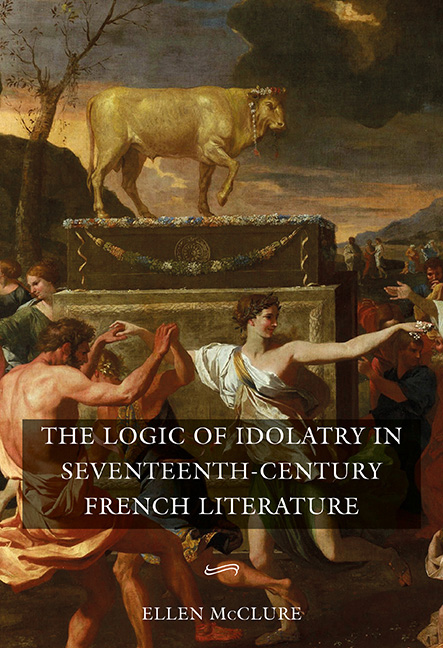Book contents
- Frontmatter
- Contents
- Notes on Translations
- Introduction: The Logic of Idolatry and the Question of Creation
- 1 Idolatry and Instability in Honoré d'Urfé's L'Astrée
- 2 Descartes’ Meditations as a Solution to Idolatry
- 3 Idolatry and the Questioning of Mastery in La Fontaine's Fables
- 4 Idolatry and the Love of the Creature in Sévigné's Letters
- 5 Theatrical Idolatry in Molière and Racine
- Conclusion: The End(s) of Idolatry
- Acknowledgments
- Bibliography
- Index
- Miscellaneous Endmatter
5 - Theatrical Idolatry in Molière and Racine
Published online by Cambridge University Press: 28 April 2020
- Frontmatter
- Contents
- Notes on Translations
- Introduction: The Logic of Idolatry and the Question of Creation
- 1 Idolatry and Instability in Honoré d'Urfé's L'Astrée
- 2 Descartes’ Meditations as a Solution to Idolatry
- 3 Idolatry and the Questioning of Mastery in La Fontaine's Fables
- 4 Idolatry and the Love of the Creature in Sévigné's Letters
- 5 Theatrical Idolatry in Molière and Racine
- Conclusion: The End(s) of Idolatry
- Acknowledgments
- Bibliography
- Index
- Miscellaneous Endmatter
Summary
Mais en cette leçon, si pompeuse & si vaine,
Le profit est douteux, & perte certaine,
Le remede y plaist moins que ne fait le poison;
Elle peut reformer un esprit idolâtre,
Mais pour changer leurs moeurs, & regler leur raison,
Les Chrestiens ont l’Eglise, & non pas le theatre.
But in this lesson, so pompous and vain,
The gain is doubtful, and the loss certain.
The remedy pleases less than the poison;
It can reform an idolatrous mind,
But to change their morals and regulate their reason,
Christians have the Church, and not the theater. [my italics]
These catchy lines, penned by Antoine Godeau, bishop of Grasse and onetime salonnier, concluded his Sonnet sur la comédie, published for the first time in the 1654 edition of his Poésies chrétiennes. As Laurent Thirouin notes, the sonnet was hugely successful, ushering in a series of polemical texts condemning the theater and cited by almost all of them. The irresistible last line drew a firm distinction between religion and theater, asserting categorically that morality, reason, and, implicitly, utility, was the domain of the former and was dangerously absent from the latter.
Yet as my added emphasis shows, Godeau's condemnation of theater was incomplete, and the admission that theater is able to “reform an idolatrous mind” is both telling and intriguing. It points to the long, intimate, and uncomfortable relationship between theater and idolatry. Already in the third century, Tertullian argued that the two were closely associated, declaring that So, if it shall be established that the whole equipment of the public shows is idolatry pure and simple, we have an indubitable decision laid down in advance, that this profession of renunciation made in baptism touches the public shows too, since they, being idolatry, belong to the devil, his pomp and his angels.
- Type
- Chapter
- Information
- The Logic of Idolatry in Seventeenth-Century French Literature , pp. 182 - 210Publisher: Boydell & BrewerPrint publication year: 2020

